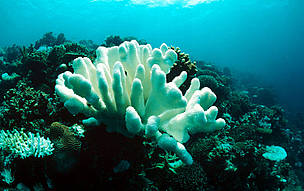Climate Change

The destruction of the ozone layer, which accompanies global warming, is caused by the presence of chlorofluorocarbons (CFCs) and other chemicals in the atmosphere. This presence causes the depletion of protective ozone in the atmosphere and increases the intensity and nature of ultraviolet radiation that reaches the earth's surface. Although corals have a natural sunscreen to protect themselves from the tropical sun, most scientists believe that increased levels of ultraviolet radiation damage coral in shallow areas.
One of the most visually dramatic effects of climate change is coral bleaching, a stress response caused by high water temperatures that can lead to coral death. Recent years have seen widespread and severe coral bleaching episodes around the world, with coral mortality reaching 70% in some regions.
Source: Coral Reef Alliance